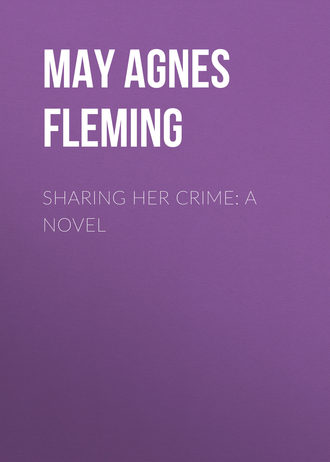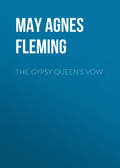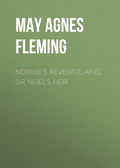
May Agnes Fleming
Sharing Her Crime: A Novel
CHAPTER XVIII.
ARCHIE
"His youthful form was middle size,
For feat of strength or exercise
Shaped in proportion fair;
And dark-blue was his eagle eye,
And auburn of the darkest dye
His short and curling hair.
Light was his footstep in the dance,
And firm his stirrup in the lists,
And oh! he had that merry glance
That seldom lady's heart resists." – Scott.
Five years passed. And the children, Gipsy and Celeste, we can never see more; for those five years have changed them into young ladies of seventeen. Strange to say, neither Louis nor Archie has met Minnette, Gipsy, or Celeste, since the time they parted to go to college: and with all the change that years have made in their appearance, it is doubtful whether they would even recognize one another now, if they met.
The way of it was this: Louis and Archie, after the life and excitement of the city, began to think that Sunset Hall was an insufferably dull place; and with the usual fickleness of youth, instead of going home to spend their vacation, invariably went with some of their school-fellows. This troubled the old squire very little; for without Gipsy, in the quiet of Sunset Hall, he was falling into a state of stupid apathy, and gave Master Louis carte blanche to go where he pleased. Lizzie was too indolent to trouble herself much about it, and as she generally went on a visit to New York every winter, she contented herself with seeing her son and heir then, and knowing he was well. As for Gipsy and Celeste, their faithless boy-lovers seemed to have quite outgrown their early affection for them.
Then, when the time came for them to graduate, and make choice of a profession, Squire Erliston found that young Mr. Oranmore would neither be doctor, lawyer, nor clergyman; nor even accept a post in the army or navy.
"Why not," said the squire, during an interview he had with him; "what's your objection?"
"Why, my dear grandfather," replied Louis, "you should have too much regard for your suffering fellow-mortals to make a doctor of me. As for being a lawyer, I haven't rascality enough for that yet; and I've too much respect for the church to take holy orders. Neither does the camp nor forecastle agree with me. I have no particular love for forced marches or wholesale slaughter; nor do I care over much for stale biscuit, bilge-water, and the cat-o'-nine-tails; so I must e'en decline all."
"Then what in the name of Heaven will you be?" exclaimed the squire.
"An artist, sir; an artist. Heaven has destined me for a painter. I feel something within me that tells me I will yet win fame and renown. Let me go to Europe – to Germany and Italy, and study the works of the glorious old masters, and I will yet win a name you will not blush to hear."
"Glorious old fiddlesticks! Go, if you like, but I never expected to find a grandson of mine such a fool! The heir of Mount Sunset and its broad lands, the heir of Oranmore Hall, and old Mother Oranmore's yellow guineas, can do as he pleases, of course. Go and waste your time daubing canvas if you will, I'll be hanged if I care!"
Therefore, six months before the return of the girls from school, Louis, accompanied by a friend, sailed for Europe without seeing them.
"And you, sir," said the squire, turning to Archie; "are you going to be a fool and turn painter, too?"
"No, sir," replied Master Archie; "I'm not going to be a fool, but I'm going to be something worse – a knave; in other words, a lawyer. As for painting, thank fortune, I've no more talent for it than I have for turning milliner, beyond painting my face when acting charades."
So Archie went to Washington, and began studying for the bar.
Gipsy, who was a universal favorite in school, began, for the last few years, to copy the example of the boys, and spend her vacations with her friends. Minnette and Celeste always returned home; for Minnette, cold, and reserved, and proud, was disliked and feared by all; and though Celeste was beloved by everybody, duty and affection forbade her to leave Miss Hagar for her own pleasure.
Our madcap friend, Gipsy, had lost none of her wicked nor mischief-loving propensities during those years. Such a pest and a plague as she was in the school, driving teachers and pupils to their wits' end with her mad pranks, and yet liked so well. There was usually a downright quarrel, about the time of the holidays, to see who would possess her; and Gipsy, after looking on and enjoying the fun, would, to the surprise and chagrin of all, go with some one who least hoped for the honor.
Gipsy was spending the winter with a school-friend, Jennie Moore, at Washington. The three girls, whose united fortunes are the subject of this history, had graduated; Minnette, with the highest honors the school could give; Celeste, with fewer laurels, but with far more love; and Gipsy – alas, that I should have to say it! – most wofully behind all. The restless elf would not study – was always at the foot of her class, and only laughed at the grave lectures of the teachers; and yawned horribly over the rules of syntax, and the trying names in her botany. So poor Gipsy left little better than when she entered.
The folding-doors of Mr. Moore's spacious drawing-room were thrown open, blazing with light and radiant with brilliantly-dressed ladies. Miss Jennie had resolved that the first ball should surpass anything that had taken place that winter. All the elite of the city, wealth, beauty, fashion, gallantry, and talent, were mingled in gay confusion. There were soft rustling of silks, and waving of perfumed handkerchiefs, and flirting of fans, and flirting of belles; and bright ladies cast killing glances from their brilliant eyes; and gentlemen bowed and smiled, and paid compliments, and talked all sorts of nonsense, and
"All went merry as a marriage bell."
Near the upper end of the room the belle, par excellence, seemed to be; for in her train flowed all that were wittiest, and gayest, and loveliest there. Whenever she moved, a throng of admirers followed; and where the laughter was loudest, the mirth highest, the crowd greatest, there might you find the center of attraction, this belle of whom I am speaking.
And yet she was not beautiful; at least, not beautiful when compared with many there who were neglected for her. She is floating now in a gay waltz round the room with a distinguished foreigner, and "I will paint her as I see her."
A small, slight, straight, lithe figure, airy and bird-like in its motions, skimming over the floor without seeming to touch it; never at rest; but quick, sudden, abrupt, and startling in all its motions, yet every motion instinct, glowing with life. A dark, bright, laughing little face, that no one knows whether it is handsome or not, it is so radiant, so bewitching, so sparkling, so full of overflowing mirth and mischief. Short, crisp black curls, adorning the sauciest little head in the world; wicked brown eyes, fairly twinkling with wickedness; a rosy little mouth, that seemed always laughing to display the little pearly teeth. Such was the star of the evening. Reader, do you recognize her?
As she seated herself after the dance, tired and a little fatigued, Jennie Moore, a pretty, graceful girl, came up to her, saying, in a low voice:
"Oh, Gipsy, I have a stranger to introduce to you – a most distinguished one. One of the cleverest and most talented young lawyers in Washington."
"Distinguished! Now, I'm tired to death of 'distinguished' people; they're all a set of bores – ugly as sin and pedantic as schoolmasters. Don't stare – it's a fact!"
"Oh, but Mr. Rivers is not; he is young, handsome, agreeable, witty, a regular lady-killer, and worth nobody knows how much."
"Mr. – worth what?" exclaimed Gipsy, springing to her feet so impulsively that her friend started back.
"Why, what's the matter?" said Jennie in surprise.
"Nothing! nothing!" said Gipsy, hastily. "Who did you say it was?"
"Mr. Archibald Rivers, student-at-law."
"Jennie, they say I've changed greatly of late. Do you think I look anything like I did when you first saw me?"
"Why, not much. You were a tawny little fright then; you're almost handsome now," said the candid Jennie.
"Then he won't know me. Jennie, will you oblige by introducing Mr. Rivers to me under an assumed name?"
"Why – "
"There! there! don't ask questions; I'll tell by and by. Go and do it."
"Well, you have always some new crotchet in your crotchety little head," said Jennie, as she started to obey.
In a few moments she reappeared, leaning on the arm of the "distinguished" Mr. Rivers. Our Archie has not changed as much as Gipsy has done during these years, save that he has grown taller and more manly-looking. He has still his frank, handsome, boyish face; his merry blue eye and boisterous manner, a little subdued.
The indistinct tone in which Miss Moore introduced him prevented him from catching the name, but he scarcely observed; and seeing in the young lady, whose lips were now pursed up and whose eyes were cast modestly on the floor, a shrinking, bashful girl, he charitably began to draw her out.
"There is quite an assembly here this evening," was his original remark, by way of encouraging her.
"Yes, sir," was the reply, in a tone slightly tremulous, which he ascribed to maiden bashfulness.
"What a delightful young lady your friend, Miss Moore, is," continued Archie.
"Yes, sir."
"There are a great many beautiful ladies in the room."
"Yes, sir."
"Confound her!" muttered Archie, "can she say nothing but 'Yes, sir?' But the most beautiful lady present is by my side," he continued, aloud, to see how she would swallow so palpable a dose of flattery.
"Yes, sir!"
"Whew! if that's not cool! I wonder if the girl's an idiot!" thought Master Archie. Then, aloud: "Do you know you're very beautiful?"
"Yes. I know it."
A stare of surprise followed this answer. Then he continued:
"You are a most bewitching young lady! Never was so much charmed by anybody in my life!"
"Sorry I can't return the compliment."
"Hallo!" thought Archie, rather taken aback. "She's not such a fool as I took her to be. What do you think of that lady!" he added, pointing to a handsome but dark-complexioned girl, whom report said would one day be Mrs Rivers.
"Oh! I don't think her pretty at all – she's such a gipsy."
Archie gave a little start at the name. Poor Gipsy! he had quite forgotten her of late.
"Do you know," he said, "I once had a little friend called Gipsy? Your words recalled her to my memory. You remind me of her, somehow, only you are handsomer. She was dark and ugly."
"Indeed! Did you like her?"
"Ye-e-e-s – a little," said Archie, hesitatingly; "she was a half-crazy little thing – black as a squaw, and I don't think I was very fond of her, but she was very fond of me."
"Indeed, sir!" said the young lady, a momentary flash gleaming from her dark eyes; "she must have been a bold girl, rather, to let you know it."
"She was bold – the boldest girl ever I knew, with nothing gentle and womanly about her whatever."
"What did you say her name was?"
"Gipsy – Gipsy Gower. You seem interested in her."
"I am, sir – I know her."
"You do?" cried Archie, aghast.
"Yes, sir; but I like her no more than you do. She was a rough, uncouth savage, detested by every one who knew her. I had the misfortune to be her room-mate in school, and she used to bore me dreadfully talking about her gawky country friends, particularly some one whom she called Archie."
"Yes? What used she to say about him? She liked him, didn't she?" said Archie, eagerly.
"Why, no; I should say not. She used to say he was a regular fool – always laughing. She said she never knew such a greeny in all her life."
Mr. Rivers suddenly wilted down, and hadn't a word to say. Just at that moment a party of Gipsy's friends came along, and it was:
"Oh, Gipsy! Gipsy! Oh, Miss Gower! we've been searching all over for you. Everybody's dying of the blues, because you are absent. Do come with us!"
Archie leaped from his seat as though he had received a bayonet thrust. Gipsy rose, saying, in a low, sarcastic voice, as she passed him:
"Remember me to Gipsy when you see her. Tell her what I said about Archie," and she was gone.
During the remainder of the evening the "distinguished" Mr. Rivers looked about as crestfallen as a young lawyer possessed of a large stock of native impudence could well do. There he stood and watched Gipsy, who had never been so magnetic, so bewitching, so entrancing in her life before. Never by chance did she look at him; but there was scarcely another masculine head in the room she had not turned.
"Confound the little witch!" muttered Master Archie, "no wonder she called me a fool! But who the deuce would ever think of finding little Gipsy Gower in one of the belles of Washington? Had it been Celeste, now, I should not have felt surprised. And who would ever think that yonder dazzling, brilliant, magnetic girl was the little shy maiden who, ten minutes ago, sat beside me with her demure 'yes, sir!' Well, she seems to be enjoying herself anyway. So, Miss Gipsy, I'll follow your example and do the same."
For the remainder of the evening Archie threw himself into the gay throng with the evident determination of enjoying himself or dying in the attempt. And more than one fair cheek flushed, and more than one pair of bright eyes grew brighter, as their owner listened with downcast lashes and smiling lips to the gallant words of the handsome young lawyer. He was, if not the handsomest, at least one of the handsomest, men in the room; and
"Oh! he had that merry glance,
That seldom lady's heart resists."
And eclipsed belles raised their graceful heads in triumph to find the bewildering Gipsy had no power over him. But if they had known all, they would have found that those "merry glances" were not for them, but to pique the jealousy of the evening star.
Ere the company dispersed he sought out Gipsy, who withdrawing herself from the revelers, stood, silent and alone, by the window.
"Gipsy!" he said, gently.
"Mr. Rivers!" she said, drawing herself up.
"Forgive me, Gipsy, for what I said."
"I have nothing to forgive! I rather think we are quits!" replied Gipsy, coolly.
"Well, make up friends with me, and be a little like the Gipsy I used to know."
"What! like that black little squaw – that bold, ugly, half-crazy thing? You astonish me, Mr. Rivers!"
"Yes, even so, Gipsy; you know it's all true; and I'll be the same 'regular fool, always laughing.' Then shake hands and call me Archie, as you used to."
"Well, now, I don't know," said Gipsy – "I don't think I ought to forgive you."
"Don't think about it, then. Nonsense, Gipsy – you know you're to be my little wife!"
She laughed and extended her hand, though her dark cheek grew crimson.
"Well, there, I forgive you, Archie. Will that do? And now let us go into the supper-room, for I'm starving. One of my early habits I have not outgrown – and that is, a most alarming appetite."
"Now I shall have her all to myself for the rest of the evening," thought Archie, as he stood beside her, and watched triumphantly the many savage and ferocious glances cast toward him by the gentlemen.
But Archie found himself slightly mistaken; for Gipsy, five minutes later, told him to be off – that he was an old bore, and not half as agreeable as the most stupid of her beaus. Then laughing at his mortified face, she danced and flirted unmercifully, leaving Mr. Rivers to think she was the most capricious elf that ever tormented a young lawyer.
Every day for a week after he was a constant visitor at Mr. Moore's. And every day for a week he went away as he came, without seeing Gipsy. She was always out riding, or driving, or "not at home," though he could see her plainly laughing at him at the window. The willful fairy seemed to take a malicious delight in teasing the life out of poor Archie. Evening after evening she accepted the escort of a handsome young English baronet, Sir George Stuart, the most devoted of all her lovers – leaving Archie to bear it as he pleased. And between jealousy, and rage, and mortification, and wounded pride, Mr. Rivers had a hard time of it. It was too bad to see his own little Gipsy – his girlish lady-love – taken from him this way without being able to say a word against it.
So Archie fell a prey to "green and yellow melancholy," and never saw the stately young nobleman without feeling a demoniacal desire to blow his brains out; and nothing prevented him from doing it but the becoming respect he had for the laws of his country.
One morning, however, for a wonder, he had the good fortune to find Gipsy alone in the parlor, looking perfectly charming in her becoming deshabille.
"How did you enjoy yourself last night at Mrs. Greer's ball? I saw you there with that fool of a baronet," said Archie, rather savagely.
"I enjoyed myself very well, as I always do. And I must beg of you not to speak of Sir George in that way, Mr. Rivers. I won't allow it."
"Oh, you won't!" sneered Archie. "You seem to think a great deal of him, Miss Gower."
"Why, of course I do! He's so handsome – so perfectly gentlemanlike – so agreeable, and so – everything else. He's a real love of a man."
"Oh! the deuce take him!"
"Why, Mr. Rivers!" said Gipsy, with a very shocked expression of countenance.
"Gipsy, be serious for once. I have had something to say to you this long time, but you have been so precious careful to keep out of my sight, I've had no chance to say it. Gipsy, do you love Sir George Stuart?"
"Why, Archie! to be sure I do."
"Oh-h-h!" groaned Archie.
"What's the matter? – got the toothache?"
"Oh, dear, no. I have the heart-ache!"
"Sorry to hear it. Better go to Deep Dale and consult Doctor Spider about it."
"Will you come with me?"
"I've no objection. I'm going home to-morrow, and I'd just as lief have you for an escort as any one else."
"Then you are not going to be married to Sir George Stuart, Gipsy?" exclaimed Archie, eagerly.
"Why, not just now, I think."
"Gipsy, would you marry me?"
"Well, I wouldn't mind, if nobody better offers."
"Oh, Gipsy! be serious; don't laugh at me now. You know you promised, when a little girl, to be my little wife. Will you, dear Gipsy?"
"There – gracious me! you're treading on Sambo's toes."
A howl from an unfortunate black pug dog testified to the truth of this remark.
"Men are such awkward creatures! Poor Sambo! did he hurt you?" said Gipsy, stooping and caressing the ugly little brute.
"Oh, saints and angels! only hear her. She will drive me mad – I know she will. Here I offer her my heart, and hand, and fortune (though I don't happen to have such a thing about me), and she begins talking about Sambo's toes. That girl will be the death of me. And when I die I'll charge them to place on my tombstone, 'Died from an overdose of a coquette.'"
And Master Archie stamped up and down, and flung his coat-tails about with an utterly distracted expression of countenance.
"Why, what nonsense are you going on with there?" inquired Gipsy, pausing in her task of comforting Sambo, and looking at him in surprise.
"Nonsense!" exclaimed Archie, pausing before her, and throwing himself into a tragic attitude. "Infatuated girl! the heart you now cast from you will haunt you in the dead hours of the night, when everything (but the mosquitoes) is sleeping; it will be ever before you in your English home, when you are the bride of Sir George (confound him!) Stuart; it will – "
But Master Archie could proceed no further; for Gipsy fell back in her chair, fairly screaming with laughter. Archie made a desperate effort to maintain his gravity, but the effort proved a failure, and he was forced to join Gipsy in an uproarious peal.
"Oh, dear!" said Gipsy, wiping her eyes, "I don't know when I have laughed so much."
"Yes," said Archie, in high dudgeon – "pretty thing to laugh at, too! After breaking my heart, to begin grinning about it. Humph!"
"You looked so funny – you looked – "
Gipsy's voice was lost in another fit of laughter.
"Come, now, Gipsy, like a good girl, don't laugh any more; but tell me, will you marry me – will you be my wife?"
"Why, yes, you dear old goose, you! I never intended to be anything else. You might have known that I'd be your wife, without making such a fuss about it," said Gipsy.
"And Sir George, Gipsy?"
"Oh, poor fellow, I gave him his coup de conge last night, and he set out for England this morning."
"Oh, Gipsy, my dear, you're a pearl without price!" exclaimed Archie, in a rapture.
"Glad to hear it, I'm sure. And now do go away, Archie, and don't bother me any longer; for I must pack up my things and start for home to-morrow."
"You little tyrant! Well, I am to accompany you, mind."
"Just as you please – only do leave me."
"Little termagant! Accept this ring as a betrothal gift."
"Well, there – put it on, and for goodness' sake clear out."
With a glance of comical despair, Mr. Rivers took his hat and quitted the house.







